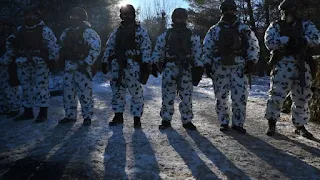Tension continues Ukraine conducts military exercises and US soldiers arrive in Poland
The Polish military said Saturday that the first US military reinforcements have arrived in Poland, as part of reassuring allies worried about Russian-Ukrainian tensions, as Ukraine conducts combat exercises near the Chernobyl nuclear exclusion zone.
A Polish military spokesman said Saturday that the transfer of US reinforcements to Poland, as part of reassuring allies worried about Russian-Ukrainian tensions, "has begun."
"The first soldiers have arrived at Jesionka airport" in the southeast of the country, said the spokesman, Major Brzenislav Lichinsky, adding that the bulk of the US battalion numbering 1,700 soldiers will arrive "soon."
Major Lichinsky said logistical preparations "began since last week". On Saturday, a plane carrying soldiers from the US 82nd Airborne Division landed in Jesionka.
On Wednesday, the United States announced the dispatch of 3,000 additional US troops to Eastern Europe to defend NATO countries "from any aggression", amid diplomatic attempts to persuade Moscow to withdraw its forces massed on Ukraine's borders.
The new US forces are added to the 8,500 soldiers that US President Joe Biden put on alert at the end of January to be deployed to the NATO Rapid Response Force if necessary.
Combat exercises near Chernobyl
These developments come at a time when Ukrainian forces continue to train at the site that has witnessed the largest radioactivity in the world and has been deserted for 35 years, where gunshots are heard in cities in the Chernobyl Exclusion Zone near the border with Belarus.
The Ukrainian National Guard conducted live-fire exercises Friday in abandoned buildings in the desolate city of Pripyat, a few kilometers from the Chernobyl power plant, and its population of about fifty thousand people was evacuated within three hours on April 27, 1986 and did not return after that.
The region is now sensitive for another reason. Moscow has massed more than 100,000 troops along the Ukrainian border, raising fears in the West of a Russian attack on Ukraine, and has deployed troops in Belarus just 10 kilometers north of Pripyat for military exercises.
The deserted streets and empty buildings of the city, which were vacated during the worst nuclear disaster in history, are an ideal training ground.
In their camouflaged winter uniforms, these special forces are training to expel armed attackers from buildings or fend off snipers in the center of a city.
Emergency services organized and ordered evacuations through loudspeakers carried by drones, which fought fires that broke out during the fighting.
"Since there are no civilians around, we can conduct live-fire exercises in conditions as close as possible to real urban street warfare," explained a member of the National Guard, who gave his name as Litva.
Prior to the unprecedented exercises in Pripyat, personnel equipped with Geiger counters had to check the site for radioactive spots beyond acceptable limits. "Everything has been checked and there is no danger," Litva said, holding his machine gun.
Some Western capitals, such as Washington and London, accuse Russia of preparing an imminent attack on Ukraine. But the Kiev authorities seem more moderate and consider it unnecessary to create "panic".
Forests, swamps and radioactivity
In Pripyat, Defense Minister Oleksich Reznikov played down the possibility of an invasion by Russian troops sent to Belarus.
Although the United States estimated the number of these forces at thirty thousand, Reznikov believed that the "few thousand" of Russians currently crossing the Belarusian border were not enough to launch an attack.
"Crossing this area is very difficult because it includes forests, swamps and rivers, and navigating it on foot is more complicated and with tanks more complex," the defense minister told reporters who were invited to a trip to attend the exercises.
"Do not forget that since the disaster there are still areas of high radioactivity on the Belarusian road," he added.
Ukraine's Interior Minister Denis Monastirsky said that due to the escalation of tension, security around all nuclear reactors has been reinforced, including the Chernobyl site, which is now covered by a huge protective box.
"We are absolutely sure that the Chernobyl nuclear power plant is not under threat," he added.
The National Guard forces in Pripyat were not training to face a massive Russian invasion, but were preparing to face the threat of undercover agents in civilian clothes who could take over buildings and cause unrest.
This is what happened when Russia annexed Crimea in 2014 and backed a separatist rebellion in eastern Ukraine. It is this kind of scenario that Kiev says it fears today, rather than a large-scale attack.
The Minister of the Interior: "We have to show that we are ready to face all events."
Tags:
britain
europe
european countries
european union
france
paris
russia
ukraine
ukraine conflict
ukraine war
ukrainian coup
ukrainian crisis





